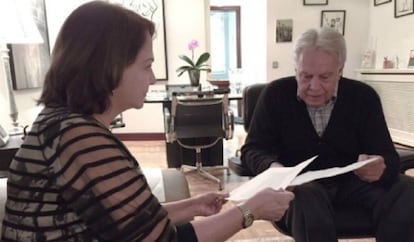Ex-Spanish PM to defend jailed Venezuelan opposition leaders
Felipe González says López and Ledezma are “political prisoners in jail for being politicians”

Former Spanish Prime Minister Felipe González has agreed to assume the legal defense of two prominent opposition leaders jailed in Venezuela after their families pleaded with him to help win their release.
The ex-Socialist Party chief will defend opposition leader Leopoldo López and Caracas Mayor Antonio Ledezma, who are being held at the Ramo Verde military prison outside Caracas with other government opponents arrested on various charges.
In an interview with EL PAÍS on Sunday, González said he decided to take on the cases because of the deteriorating human rights situation in Venezuela and the absence of guarantees afforded to the prisoners while they are being held.
There is an absence of guarantees afforded to the prisoners while they are being held, says González
González also wants to try to break the silence among other Latin American nations over the abuses President Nicolás Maduro has committed against the opposition, he said.
So far, efforts by the Organization of American States (OAS) and the Union of South American Nations (Unasur) to mediate in the situation have proved fruitless. Caracas has also ignored pleas to release the political dissidents by the United Nations, and the governments of the United States, Spain, Canada and Colombia.
Human Rights Watch, Amnesty International and Socialist International have also asked Maduro to free the prisoners.
González, who has maintained a close relationship with Venezuela since the 1980s, said on Sunday that he was concerned about the “lack of the defense of democracy in Latin America” and would push for “a serious dialogue” between the Maduro government and the Venezuelan opposition.
“And part of that dialogue will be that you can’t arrest representatives of the political parties. President Maduro says there are no political prisoners, just imprisoned politicians. I would say there are political prisoners who are in jail for being politicians,” he said.
Ledezma was arrested at his office on February 20 after he was charged with plotting to overthrow the Maduro administration by signing a declaration calling for a transitional government.
López, who has been in prison for the past 13 months, is on trial on charges related to vandalism and inciting the unrest that occurred during the February 2014 nationwide anti-government protests in which at least 40 people were killed.
Last November, around 30 former heads of state and government, who belong to the Club de Madrid group of pro-democracy intellectuals, signed a declaration in Florence in which they described López’s detention as “arbitrary” and demanded that he be freed.
Among those signing the statement were ex-presidents Fernando Henrique Cardoso (Brazil), Ricardo Lagos (Chile), Alejandro Toledo (Peru), Luis Alberto Lacalle (Uruguay), Óscar Arias (Costa Rica), Andrés Pastrana (Colombia), Jorge Quiroga (Bolivia) and Osvaldo Hurtado (Ecuador).
Since the political crisis began, Venezuela’s social and economic situations have deteriorated
Since the political crisis began, Venezuela’s social and economic situations have deteriorated. The country is suffering from the highest inflation in the world, estimated at 70 percent, and has had to devaluate its bolivar currency while its citizens struggle with severe shortages of food, medicines and basic supplies.
The ongoing crisis has only fueled the tension between the Maduro government and the opposition, especially now as the president recently authorized military officers to fire on protestors during rallies – a move that goes against the Constitution.
Ledezma’s wife Mitzy Caprilies, who has warned President Maduro that she will hold him responsible for her husband’s safety, recently met European Parliament members and visited Madrid, where she talked with Prime Minister Mariano Rajoy and former Spanish leaders González and Jose María Aznar. She also met Socialist Party secretary-general Pedro Sánchez.
In a statement leaked to El PAÍS from his prison cell, López said he was held in total isolation for six months following his arrest. He went on to describe his current situation: “The conversations with my defense team are taped. They read and confiscate my mail arbitrarily. We have been victims of violent searches by military intelligence commandos. They have thrown human excrement into our cells and we are being taped directly and secretly at every moment.”
One NGO estimates that 102 people have been detained or are awaiting trial for political violence
Foro Penal, a Venezuelan NGO, estimates that 102 people have been detained or are awaiting trial for political violence.
The group has also denounced that arbitrary trials have taken place. So far, López’s lawyers have not been able to present any witnesses in his defense.
On March 13, one government opponent, Rodolfo González, 64, was found dead in his prison cell. Authorities ruled his death a suicide.
González had been arrested for organizing anti-government protests last year. The only testimony against him was from an anonymous witness. The Maduro regime has praised such informers as “patriotic collaborators.”







































